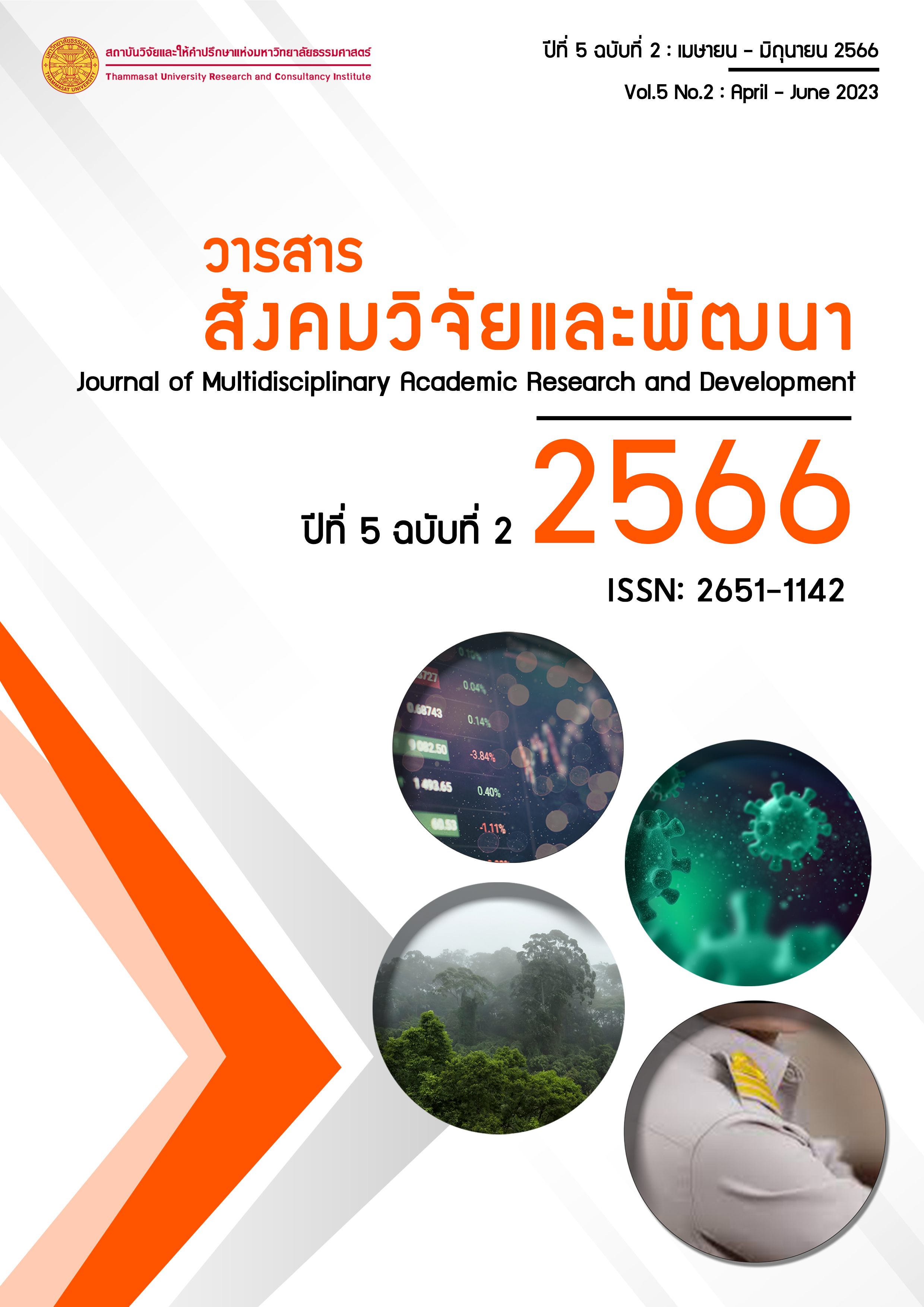Proposed Strategy for STEM Educational Policy Implementation by using Bioecological System Theory
Keywords:
Critical policy analysis , Bioecological system, Proposed strategy, STEM educationAbstract
This article aimed to examine the problems and obstacles in implementing STEM education policy in Thailand and preparing the proposed strategy for STEM educational policy implementation. The data were collected from 2 phases: 1) an analysis of 15 acadermic documents from 2015 to the present by using document analysis method and 2) in-depth interviews with 39 key informants in 13 regional STEM education centres covered four regions in Thailand. The key informants were 1) 26 teachers with two years experience of STEM education teaching and 2) 13 alumni who have completed STEM education at the secondary level. The Critical policy analysis framework and bioecology system theory were used to analyze the proposed strategy for STEM educational policy implementation. The results showed that problems and obstacles in STEM learning management approach were: 1) awaring and supporing from authirities to drive STEM education lacking in the procedure 2) ambiguity of human resources and responsible agency transfer affecting on the school network operation 3) lacking of internal and external relationship context of the school and the environment and 4) Lacking of consistency between the STEM education management and the learning age of each student. In addition, the proposed strategy for driving STEM education policy continuously and sustainably based on the bioecological theory. Policy drivers should consider how schools raise awareness of their implementation goals, and create a positive attitude toward STEM education. as well as considering the various contexts involved by changing a positive view of science and mathematics on students.
References
โกเมศ แดงทองดี. (2560). การศึกษาในยุค Thailand 4.0. วารสารการอาชีวศึกษาภาคกลาง. 1(1), 1-6.
ชรินรัตน์ จิตตสุโภ. (2560). ข้อเสนอเชิงนโยบายการบริหารสถานศึกษาขนาดเล็กสู่ความเป็นเลิศ สังกัดสำนักงานเขตพื้นที่การศึกษามัธยมศึกษา. (ดุษฎีนิพนธ์พุทธศาสตรดุษฎีบัณฑิต, มหาจุฬาลงกรณราชวิทยาลัย).
ณัฐวุฒิ พงศ์สิริ. (2560). ผู้นำที่เรียกว่า Digital Leader ในยุคเศรษฐกิจดิจิทัล. HR Society Magazine. 15 (172), 20-23.
บุญมี พันธุ์ไทย. (2565). การวิจัยเชิงคุณภาพ. วารสารปรัชญาดุษฎีบัณฑิตทางสังคมศาสตร์. 1(2), 1-10.
ประสงค์สิทธิ์ ราชชมภู และนิธิตา สิริพงศ์ทักษิณ. (2563). กระบวนการนำนโยบายสะเต็มศึกษาไปปฏิบัติในโรงเรียนสังกัดกรุงเทพมหานคร. วารสารการบริหารปกครอง (Governance Journal). 9(2), 541-556.
ประสาท เนืองเฉลิม. (2558). การเรียนรู้วิทยาศาสตร์ในศตวรรษที่ 21. สำนักพิมพ์แห่งจุฬาลงกรณ์มหาวิทยาลัย.
พัชราพรรณ ชอบธรรม. (2562). การวางแผนกลยุทธ์ : เครื่องมือสู่ความสําเร็จขององค์การ. วารสารมนุษยศาสตร์และสังคมศาสตร์ มหาวิทยาลัยราชภัฏเชียงใหม่. 1(2), 55-75.
พัชราภา ตันติชูเวช. (2559). แนวทางการจัดการเรียนรู้สำหรับเด็กและเยาวชนนอกระบบการศึกษา: กรณีศึกษาจังหวัดตาก. รายงานการวิจัยมหาวิทยาลัยธุรกิจบัณฑิตย์.
ภาริณี สุวรรณศรี และประสาท เนืองเฉลิม. (2562). ธรรมชาติของวิทยาศาสตร์กับการเรียนรู้ในศตวรรษที่ 21. วารสารครุศาสตร์ มหาวิทยาลัยราชภัฏสกลนคร (Online). 1(1), 20-25.
ระพีพัฒน์ หาญโสภา, พระมหาศุภชัย ศุภกิจโจ และประยุทธ ชูสอน. (2563). การพัฒนาทักษะการเรียนรู้ในศตวรรษที่ 21 สำหรับโรงเรียนร่มโพธิ์ทองธรรมวิทย์. วารสารสังคมศาสตร์และมานุษยวิทยาเชิงพุทธ วัดวังตะวันตก. 5(11), 18-31.
รัตนาภร ภัทรกุลดุษฎี. (2561). การศึกษาสภาพปัญหาการจัดการเรียนการสอนแบบ STEM Education ด้วยกระบวนการ PLC (Professional Learning Community) โรงเรียนในสังกัดสำนักงานเขตพื้นที่การศึกษาประถมศึกษาน่านเขต 1. น่าน: สำนักงานเขตพื้นที่การศึกษาประถมศึกษาน่าน เขต 1.
วรกันยา แก้วกลม, พินิจ ขำวงษ์, และจรรยา ดาสา. (2561). สภาพปัจจุบันปัญหาและความต้องการในการจัดการเรียนรู้สะเต็มศึกษาของครูวิทยาศาสตร์ระดับประถมศึกษา. วารสารอิเล็กทรอนิกส์ Veridian มหาวิทยาลัยศิลปากร (มนุษยศาสตร์สังคมศาสตร์และศิลปะ). 11(3), 2092-2112.
วรรณรัตน์ ลาวัง และรัชนี สรรเสริญ. (2558). PPCT Model: รูปแบบชีวนิเวศวิทยาเพื่อพัฒนาสุขภาพผู้มีภาวะเจ็บป่วยเรื้อรังในชุมชน. วารสารพยาบาลทหารบก. 16(2), 15-20.
สถาบันส่งเสริมการสอนวิทยาศาสตร์และเทคโนโลยี. (2558). คู่มือจัดกิจกรรมสะเต็มศึกษา ระดับชั้นมัธยมศึกษาปี ที่ 1-3. องค์การค้าของ สกสค.
สรินทร์ภรณ์ พินิจเวชการ. (2561). การศึกษานักเรียนที่ต้องการความช่วยเหลือพิเศษทางด้านการอ่าน: กรณีศึกษา นักเรียนระดับชั้นประถมศึกษาปีที่ 5 โรงเรียนแห่งหนึ่ง ในเขตภาคกลาง. (วิทยานิพนธ์ ศึกษาศาสตรมหาบัณฑิต. มหาวิทยาลัยธรรมศาสตร์).
สัญญา ยือราน และศิวิไลซ์ วนรัตน์วิจิตร. (2561). การวิจัยเชิงปฏิบัติการแบบมีส่วนร่วมสู่ความสำเร็จการเปลี่ยนแปลงนโยบายในระบบสุขภาพ. วารสารเครือข่ายวิทยาลัยพยาบาลและการสาธารณสุขภาคใต้. 5(2), 288-300.
อัครวัฒน์ ศรีสวัสดิ์ และโชคชัย ยืนยง. (2564). การส่งเสริมวิทยาศาสตร์ศึกษาสู่การปรับเปลี่ยนมโนทัศน์การเรียนรู้ในโรงเรียนมัธยมศึกษา เกี่ยวกับการศึกษาในอนาคตตามแนวคิดเข็มทิศการเรียนรู้ 2030 ของ OECD. วารสารชุมชนแห่งการเรียนรู้วิชาชีพครู. 1(2), 138-155.
Ahmed, I. K. & Dantata, B. S. (2016). Problems and Challenges of Policy Implementation for National Development. Research on Humanities and Social Sciences. 6(15), 60-65.
Altuger-Genc, G. & Issapour, M. (2015). Preparing STEM teachers for integration of NGSS: A summer workshop development. Journal of Education and Learning. 9(4), 305-313.
Bronfenbrenner, U. (1977). Toward an experimental ecology of human development. American Psychologist. 32, 515-531.
Bronfenbrenner, U. (2005). Making human beings human : Bioecological perspectives on human development. Thousand Oaks.
Diem, S. & Young, M. D. (2015). Considering critical turns in research on educational policy. International Journal of Educational Management. 29(7), 838-850.
Ejiwale, J. (2013). Barriers to successful implementation of STEM education. Journal of Education and Learning. 7(2), 63-74.
Sritrakul, P. (2018). The state of STEM education policy in Northern Region, Thailand. Humanities, Arts and Social Sciences Studies. 18(1), 129-147.
Downloads
Published
How to Cite
Issue
Section
License
Copyright (c) 2023 Chadchai Khogkhao

This work is licensed under a Creative Commons Attribution-NonCommercial-NoDerivatives 4.0 International License.



